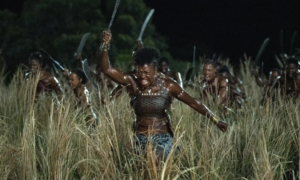‘This is an old story of heroism, of feminism’: the truth behind The Woman King
When French soldiers tried to colonise the west African kingdom of Dahomey, they encountered a foe unlike any they had faced before. The Agojie were known for raiding villages, taking captives and cutting off the head of anyone who resisted. And they were made up entirely of women.
“The French were shocked,” Professor Leonard Wantchekon, a leading Agojie scholar, says by phone from Princeton University in New Jersey. “They knew about them before but they didn’t know they were such effective soldiers, so brave, so strong.”
That France, supposedly the cradle of the Enlightenment, was backward in its essentialist views of gender is just one of the political blows landed by The Woman King, a new $50m historical epic that tells the Agojie’s story, though most of the characters are fictional.
The film is made largely by women and features an almost entirely Black cast. It is directed by Gina Prince-Bythewood and stars Oscar winner Viola Davis as a general who trains the next generation of fighters. Davis told the Reuters news agency: “It’s our story. There is no white saviour in the movie. There’s none. We save ourselves.”
The Dahomey kingdom, in the west African that region that is now Benin, was established around 1600 and grew strong from both its military prowess and from capturing and selling hundreds of thousands of people from neighbouring tribes and nations to the transatlantic slave trade. It fell in 1894 after war with France led to its eventual colonisation.
In Dahomey culture all official roles – from financial advisers to religious leaders to military generals – were balanced by both a male and female leader. The king would bestow the title of Kpojito, or Woman King, on a female reign mate.
Wantchekon, who was born and raised in Benin and served as historical adviser on the film, says: “What is very unique is social norms in Dahomey were very gender inclusive. Girls played with boys and took part in any activity that boys are involved in, which is farming and trading, cultural activities. There had always been a strong sense of equitable gender norms and representation of women in government.”
